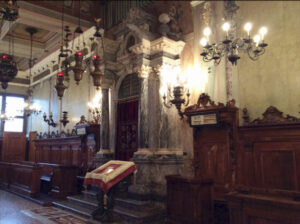On the European Day of Jewish Culture, Padua will lead along the paths of dialogue
 “A responsibility we face with pride, even given the particular topic that will be touched upon. In an era in which words of hatred and opposition are spreading, we Jews, also due to our role as a minority, have the duty to lead the way”. These are the words Gianni Parenzo, president of the Jewish Community of Padua, used in April to comment on the fact that Padua will be the leading Italian city of the 22nd European Day of Jewish Culture, scheduled for Sunday 10 October. Everything will be revolving around a theme that lends itself to a range of possible declensions: “Dialogues”.
“A responsibility we face with pride, even given the particular topic that will be touched upon. In an era in which words of hatred and opposition are spreading, we Jews, also due to our role as a minority, have the duty to lead the way”. These are the words Gianni Parenzo, president of the Jewish Community of Padua, used in April to comment on the fact that Padua will be the leading Italian city of the 22nd European Day of Jewish Culture, scheduled for Sunday 10 October. Everything will be revolving around a theme that lends itself to a range of possible declensions: “Dialogues”.
Amongst the many perspectives whose strength must be restored, enhancing a Jewish history in which “there has always been an underground river of dialogue and exchange, even alongside the forced diasporas, the centuries of discrimination and subordination, the Inquisition, the era of ghettos, modern anti-Semitism, and its tragic consequences in the first half of the 20th century”, as recalls UCEI President Noemi Di Segni. It is about a beneficial form of dialogue which has brought about examples of bright coexistence in many fields.
An international centre of reference for rabbinic education, blessed over the centuries by the presence of some of the most distinguished Rabbis and scholars, Jewish Padua has expressed a vast array of intellectuals, academics, and professionals in several different ages. It will be a solid contribution to a social progress which, also when proportionate to numbers, has few equals in Italy or around the world. Even at the time of the Ghetto, even in those generations that most suffered marginalization and exclusion, this momentum was never lacking.
This was also possible thanks to a university which, being the sole one in Europe, has never slammed the door on its Jewish students, except under fascism. There is a lot of truth in what former president Davide Romanin Jacur says with a smile: “Between the end of the nineteenth century and the beginning of the twentieth century, all the major elected offices were assigned to Jews: the mayor, the rector, the president of the hospital. Or even parliamentarians, like my ancestor Leone Romanin Jacur, who was a key figure in the reclamation work. Even Luigi Luzzatti, the Italian Prime Minister, was a Paduan by adoption. Only the bishop, I might say, was not a Jew”.
It is a story with ancient roots an great personalities. Today it presents critical issues, opportunities, and a challenge, which Adolfo Locci summarised as follows: “Ensuring continuity for generations”. Even despite all the problems and restrictions of the Covid regime, there has been no lack of happy moments such as births and Bar Mitzvah ceremonies. A small, yet still lively community that never stopped aiming for the future.
(Above, the synagogue of Padua, the leading Italian city of the 22end European Day of Jewish Culture)
Translated by Gianluca Pace, student at the Advanced School for Interpreters and Translators of the University of Trieste, and revised by Oyebuchi Lucia Leonard, student at the University of Trieste, interns at the newspaper office of the Union of the Italian Jewish Communities.
